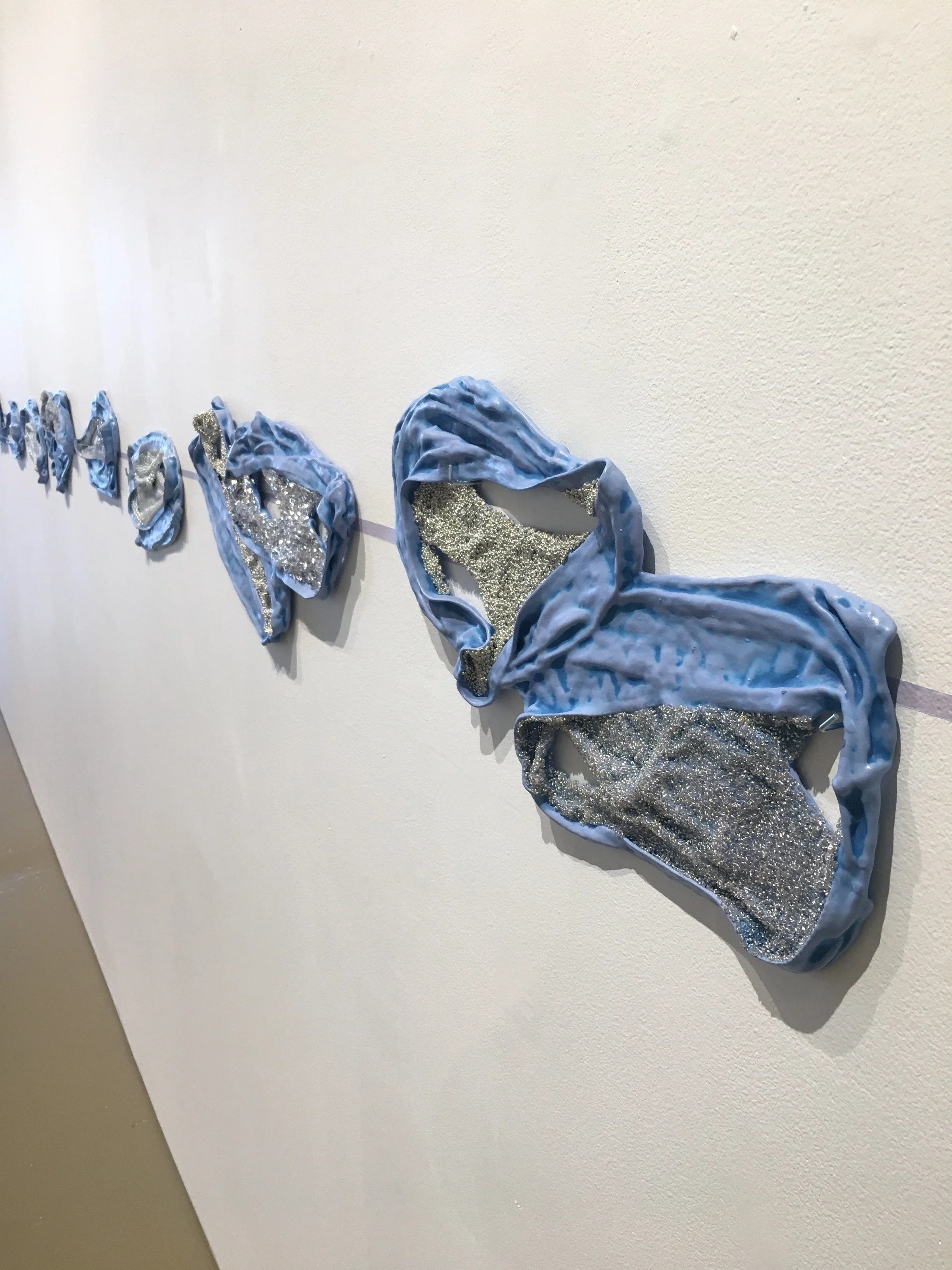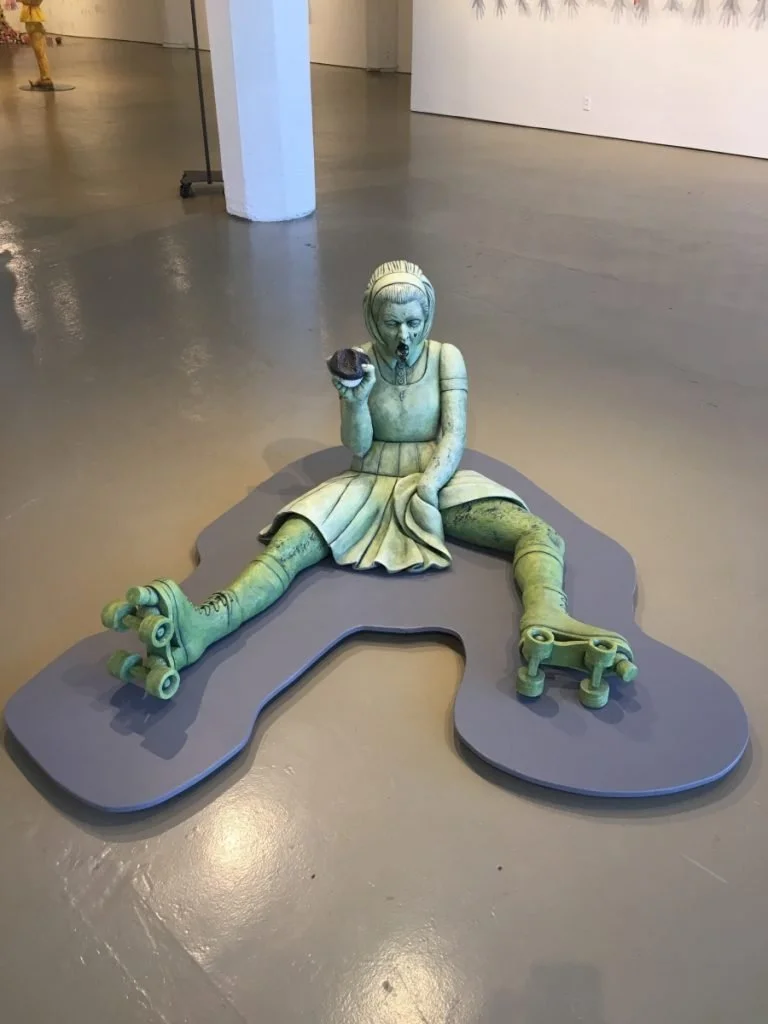Misty Gamble’s Decade of Femininity and Indulgence
Placed around the gallery are sculptural forms of women that defy presumed standards of
beauty coexisting with ceramic bedazzled panties. Within these offsetting representations of
femininity lie truths about beauty, all held within a thick coat of Rococo pizazz. Misty
Gamble’s ten-year retrospective, Decade, at the Leedy-Voulkos Art Center, takes a critical
stance on the problems of womanhood, indulgence, and modern day communication. A
current professor at School of Foundations at the Kansas City Art Institute, Gamble’s work
fetishisizes the cultural critique of women, while challenging the current status quo of
communication in present time.
The interesting part lies where these two ideas merge to create one societal commentary.
Women are used in advertising to sexualize everything, from hamburgers to high end cars.
Selling through the lens and seduction of the body activates the desire of consumers.
Gamble is taking our knowledge of this and exploiting it; we are aware of our tendencies to
be attracted to things that look good on the exterior, while the interior tells a more haunting
truth. The work also provides a disturbing look at the reality of women’s lived experience,
mainly in the realm of body image and introspection. There lies a strong contrast between
Gamble’s figures and the thin, photoshopped celebrity ideals that are at the heart of
American culture. These psychological connections bring about a disturbing, yet real narrative of
the lives of women who exist outside society’s connotations of beautiful.
The superficial surfaces of seductive color Gamble uses wisely, making us get close look deep, and
see figures with truths that are haunting, painful and close to reality. This work stands in contrast
to the fixated realms of body image. Deeper psychological connections are brought to the surface
and illuminate the lives of women who exist outside society’s strict rules of beautiful. In viewing
this body of work as individually, the themes of feminism, cultural critique, and capitalist
overindulgence appear. The celebratory use of gender-specific objects woven with glitter and
sequins provide a flashy take on womanhood that we normally don’t get to embrace without the
fear of criticism. In all of Gamble’s depictions, they are sculpted with a hand of sympathy. Gamble
simulates the lived experience of womanhood through the facial expressions and body
positionings of the figures. The most emotion provoking and haunting gazes lie in the eyes of her
full-body sculptures, depicting figures of different ages as sleep-deprived zombies. Each one of
these works provides a snapshot of the playfulness and compliance that every good woman is
expected to possess.
Photo of Indulgence & Succulence by Misty Gamble. Photo by Erin Woodworth.
While her work draws references to physicalities and bodily deformations, Gamble also
sheds light on the psyche of women. In her sculptural busts, the identity of the figures is
taken over by the unrealistic standards imposed on them. These pieces usually contain
abstracted cranial deformations or something the audience can grasp as concrete, such as
cupcakes. Gamble’s work reveals private conflicts inside the mind of a woman, mainly in her
use of gesturing and sexual objectification. This creates tension between the viewers and the
work, as some of the pieces are hard to face for long. It is important to witness is the
extreme, personal connection viewers form with each one of these works. We can either
relate to the emotional state of the figures, or to the trance you’re brought into as you’re
encompassed in them while you come together with various states of the human gaze.
Betsy by Misty Gamble. Photo Credit: Erin Woodworth.
Overall, Gamble challenges the stereotype of women by exposing the underlying fetishes
and their flirtation with disaster. By exploring the psyche of an individual, she distinguishes
the various levels of consciousness we possess, and acknowledges the struggles we face
ethically as humans capable of change. Gamble’s exhibition has a conversation with the
contemporary political climate, as her work shifts throughout this showcased decade. With
the ethical stances held by the majority of America seemingly shifting backwards in progress,
we face the problem of gender equality being exploited even more than it was under
previous administrations. Gamble’s work shifts the conversation from the acknowledgement
of the divide and it’s prominence within a contemporary context, to making a comment on the
emotional tolls that challenge has on women and their individual psyches.
Misty Gamble: Decade runs from January 6th, 2017- April 1st, 2017 at the Leedy-Voulkos Art
Center. More info on the exhibition can be found here





